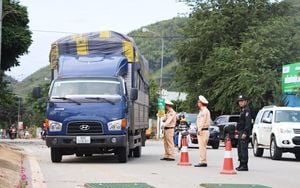Tensions escalated significantly on February 20, 2024, when Palestinian armed groups delivered the bodies of four Israeli hostages to the International Committee of the Red Cross (ICRC) at Khan Younis, located in the southern region of the Gaza Strip. This event is seen not just as a humanitarian gesture but as part of the broader and complex narrative surrounding the Israeli-Palestinian conflict.
The handover involved representatives from Hamas and ICRC officials who formally signed documents to complete the transaction. This action has drawn mixed reactions across the region, underlining the fragile nature of peace and the deep divisions between Israelis and Palestinians.
Critical reactions also surfaced from various organizations outside the region, including the Indonesian Ulema Council (MUI), which recently declared dates produced in Israel as haram, or forbidden, for Muslims. MUI's statement aims to dissuade the Muslim community from purchasing these products, emphasizing the longstanding socio-political ramifications of supporting the Israeli economy. Sudarmoto, the Chair of MUI’s Foreign Relations and International Work Department, stated, "If there are Israeli dates, do not buy them." This boycott against Israeli products exemplifies the religious and economic dimensions intertwined with the broader sociopolitical conflict.
The conflict over dates, which many Muslims enjoy during Ramadan, highlights how even agricultural products can become symbols within the larger Israeli-Palestinian discourse. The MUI's recent actions reflect how consumer choices are impacted by political sensitivities, urging followers to avoid supporting businesses tied to occupation narratives.
The backdrop to this complex series of events is rooted deeply within the history of the Israeli-Palestinian conflict, which ignites passions and emotions on both sides. The handover of hostages is partially viewed as attempts from Palestinian groups to build goodwill, yet it remains overshadowed by the contested nature of their recognition and the humanitarian crises resulting from years of conflict.
Such actions are often met with fears from the Israeli side. Many Israelis perceive these events through the lens of security and the terror threats posed by Hamas and other militant groups operating within Gaza. The return of hostages can be seen as victory narratives on one side — as evidence of their power and capability — yet fail to resolve the overarching circumstances leading to continued hostilities.
While the teams engaged, including international observers and humanitarian organizations like the Red Cross, often endeavor to mediate between these factions, the hostilities and backlash against actions such as boycotts reveal the deep-seated grievances of both parties.
The wider international community has frequently called for measures to address the humanitarian needs on both sides, advocating peace talks and negotiations to achieve lasting resolutions. The current events and boycotts can be contextualized within these calls, underscoring how economic and humanitarian issues are tragically linked.
Despite the handover marking a step, even if it is small, toward possible reconciliation, the echoes of this gesture resonate loudly. The ramifications of the MUI's statements concerning Israeli dates reflect larger questions concerning identity, faith, and the impact of consumer decisions amid the political fog. People are reminded of how the everyday can so deeply intertwine with the geopolitical.
Moving forward, the key for leaders and ordinary citizens alike might be to find space for dialogue. History suggests such moments of goodwill – even those occurring within the trauma of initial loss or conflict – often illuminate alternative paths forward. Yet for peace to truly germinate, it requires mutual respect, acknowledgment of narratives, and above all, sincere humanitarian attempts from all involved.
The situation remains delicate, and the significance of these events will likely be examined for years to come. The shadows of history and the hope for peace intersect amid handshakes over bodies returned and calls for boycotts, wanting to see justice served without sacrificing humanity amid all strife.



